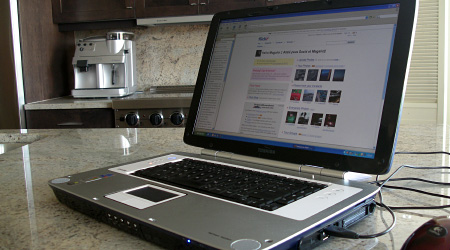7 Tips For Buying A Used Laptop

Many of you will realize that it is very expensive to keep up with the latest technology. It's also true that laptops lose a lot of their value over the space of a year or so. Something that sold for thousands this time last year, may be able to be bought for a few hundred now. If you buy a used laptop, you are able to get some incredible deals, but some people are wary about not going to a store. By following these 7 tips for buying a used laptop, you can be sure that you will get a quality laptop, at a fraction of the price of a new one.
Tip 1: How Will You Use It?
Decide what you actually want to do with your laptop, and a set of minimum specifications that are acceptable for this use. A great rule of thumb is to use the system requirements of the application or program that you will be using most often to act as a guideline.
Tip 2: Check The Chassis
When looking at a laptop you should carefully examine the case and chassis. Check the corners for signs of impacts or being dropped. The last thing you want to do is buy a laptop that has been repaired with sticky tape or glue! You may be able to live with a few cosmetic defects, such as scuffs or scrapes, but if the chassis of the laptop is damaged or bent it could lead to the whole laptop falling apart.
Tip 3: Check The Laptop Screen
Always check the condition of the screen, this is the main interface that you will interact with, so you need to ensure there is no major damage. Again, it is perfectly reasonable to put up with a light scratch here or there, but if there are any dead pixels or flickering then you may want to walk away from the deal and find something else, as the cost of repairing these faults may be more than the laptop is actually worth. Check the condition of the hinges for any damage or play to make sure the screen actually stays open in a comfortable working position.
Tip 4: Check the Battery
It is important to ensure that the power supply and battery are both in working order. It's a good idea to ask the seller to show you the battery with a full charge and then run the computer on battery power for as long as you can.
Take a note of how much of the battery runs down. Often, when a battery is on it's last legs, it will show a full charge one minute, and as soon as the AC adapter is removed it will deplete very quickly. Also make sure that the connection where the AC adapter is plugged in isn't lose. Try wiggling the wire to see if the charge light goes out or if power is lost.
Tip 5: Check The Temperature
Cooling is very important to laptop computers, so it is essential that you check this out. Too much heat can dramatically shorten the lifespan of the components inside, and is also very uncomfortable if you actually use a laptop on your lap. So if the laptop feels excessively hot you should probably walk away.
Tip 6: Test The Keyboard
Try to test as many of the keyboards keys as possible to ensure there are no broken or intermittent connections. Also test all accessories or other connections such as a CD or DVD drive, USB connections, webcam etc. It would be very disappointing to get home to realize one of these didn't work. Remember, if you can find a fault, you can use it to bargain a lower price, so try to check everything you possibly can!
Tip 7: Other Components
There are a couple of things which can add value to a used laptop, such as a Microsoft Certificate of Authenticity (the little sticker which is commonly placed on the underside of laptops to certify they are using a legal copy of Windows), restore and recovery disks, original peripherals, and manuals/owner handbooks and guides. If any of these items are missing you may be able to renegotiate the price to save yourself a bit of cash.
Conclusion
In summary, it can be a lot of fun to buy a used laptop, especially when you manage to find a real bargain. You will also be doing your part to help recycle technology, which in the long run will help our environment. Remember, a used laptop will have already depreciated by the time you buy it; this means that if you decide you don't like it, you will be able to sell it on for the price you paid. Who knows, if you are good at negotiating you may actually be able to buy a used laptop and sell it on for a small profit!







